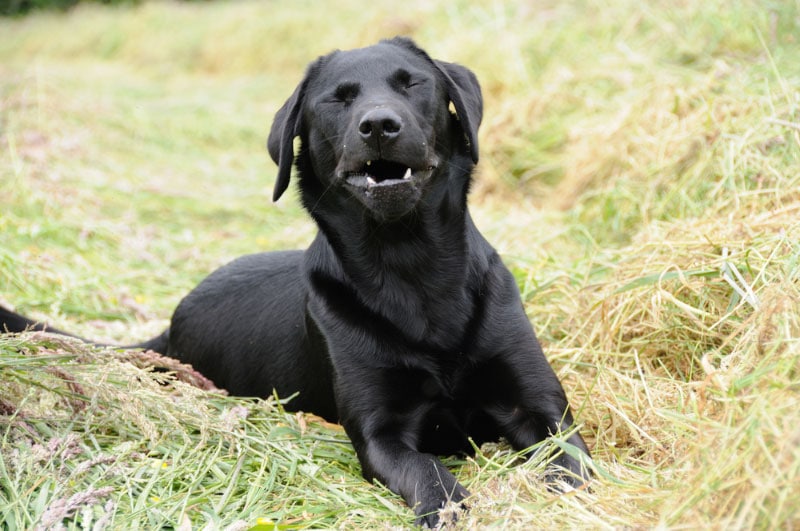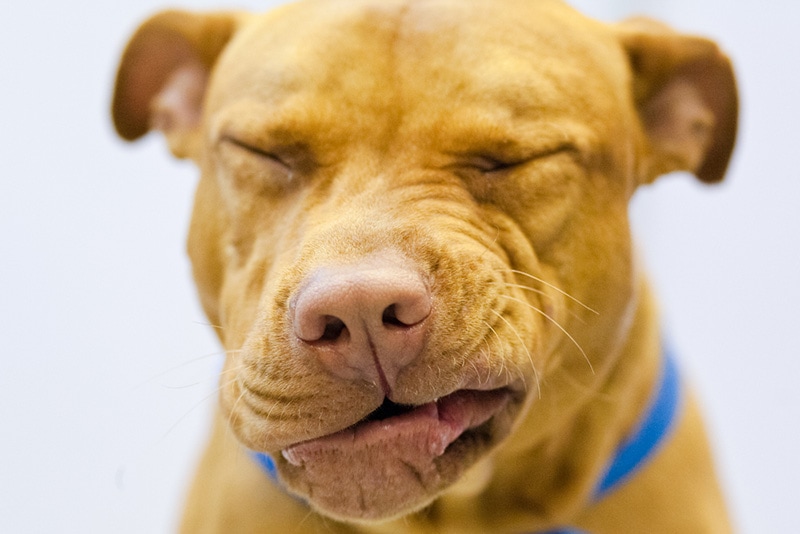Why Is My Dog Sneezing So Much? 10 Common Reasons
Updated on

We’ve all been there—it’s the middle of cold or allergy season and you can’t seem to stop sneezing. But this time, you noticed that your dog seems to be sneezing a lot, too. Is it normal for dogs to sneeze, though? Can they get colds and allergies like we can? Here are a few potential reasons you should know about if your dog seems to be sneezing a lot.
The 10 Reasons Your Dog Sneezes So Much
1. Environmental Allergies
Just like humans, dogs can be impacted by environmental allergens. Grasses, pollen, and dander are all potential allergens that your dog is exposed to. For dogs with allergies to these things, it’s not uncommon for them to sneeze. When allergens are at their highest, whether it’s due to the weather or changes in the home, your dog may sneeze excessively. In most cases, sneezing due to allergies is non-productive, although a small amount of thin, clear mucus may be seen.
2. Food Allergies
Although less commonly the cause of sneezing, exposure to food allergens can also cause some sneezing in your dog. Some dogs are allergic to proteins, like chicken, eggs, and beef, and when they eat these allergens, it leads to an allergic reaction within the body. While you might see sneezing, you’re also likely to see skin problems, like itchiness, redness, hair loss, and thickening of the skin in severe cases.

3. Nasal Foreign Bodies
Surprisingly, there are a lot of things that can get up your dog’s nose, and just like if you had something stuck in your nose, your dog will likely begin to sneeze to try to dislodge the foreign object. Nasal foreign bodies can range from seeds and other parts of plants to food and gravel.
If you think your dog has managed to get a foreign body in their nose, do not try to remove it on your own. They need to be seen by a vet to remove the object in order to prevent damage to the nasal passages.
4. Nasal Irritants
There are a lot of things that may irritate your dog’s nasal passages that aren’t allergies and foreign bodies. Think about the things that make you sneeze, simply by breathing them, like black pepper and dust. These things can also bother your dog, leading to excessive sneezing. Other irritants can include things like cleaning products and paint fumes.
If you suspect your dog has been exposed to dangerous nasal irritants, they need to be moved to an area away from the irritant with good airflow, and they may need to be taken to a vet.

5. Nasal Mites
Although not particularly common, dogs can get mites that infest their nasal passages. Mites are tiny insects that are often too small to be seen with the naked eye, so it can be very difficult for you to identify nasal mites on your own at home. Oftentimes, your vet will need a microscope to diagnose nasal mites. With nasal mites, you will likely see thick and potentially bloody mucus being expelled from your pup’s snout.
6. Nasal Tumors
Unfortunately, the nasal passages aren’t safe from the risk of developing tumors. Nasal tumors can be benign or malignant, but they can be very difficult to treat. Surgery is usually the solution for these tumors, and with malignant nasal tumors, your dog may not exhibit symptoms until the cancer has had time to begin spreading. These tumors can be painful and deadly and may be accompanied by bloody discharge from the affected side of the nose.

7. Respiratory Infections
There are multiple types of respiratory tract infections that dogs can pick up, between viral, bacterial, and fungal causes. Exposure to sick animals, environmental exposure, and immune system depression can all put your dog at risk for developing respiratory infections. Some respiratory infections are accompanied by an increase in mucus production and irritation in the nasal passages, leading to sneezing.
8. Nasal Infections
Not only can dogs get infections in their respiratory tract, but there are also infections that can occur just in the nasal passages. Things that damage the protective barrier of the mucus membranes in the nose, like nasal foreign bodies and mites, can allow infections to take hold. Your dog may also experience sneezing from an infection in a tooth root, which is usually accompanied by facial swelling, pain, and a decrease in appetite.

9. Respiratory Parasites
Dogs can get mites just in their nasal passages, but there are some parasites that attack the entire respiratory system, sometimes even settling in the lungs. Different species of lungworm, including roundworm and fluke, can infect your dog’s lungs, leading to irritation of the respiratory tract. Excess mucus production from the body attempting to deal with the parasite can lead to sneezing.
10. Play
There is a reason that your dog may be sneezing, and it has nothing to do with any physiological factors. When dogs are playing, they will sometimes sneeze. This is one of the ways that they show that they are playing and not acting aggressively. While humans often overlook this behavior, other dogs are likely to notice and understand it.

Conclusion
If your dog has suddenly started sneezing excessively, then a vet visit is warranted, even if you suspect a simple and benign cause. It’s best to rule out serious infections, parasites, foreign bodies, and tumors. In some cases, your dog may need medication or continuing medical care to deal with the cause of their sneezing.
See also:
- How to Stop Dog Aggression Toward Cats: 10 Simple Steps
- Why Isn’t My Puppy Eating? Vet Explained Reasons & What to Do
Featured Image Credit: RHIMAGE, Shutterstock













